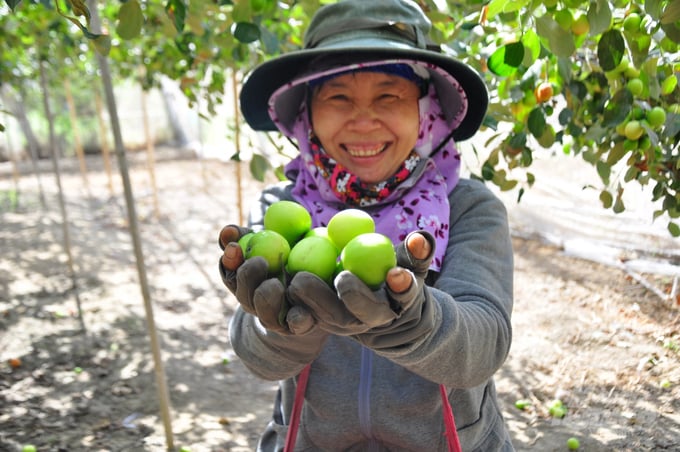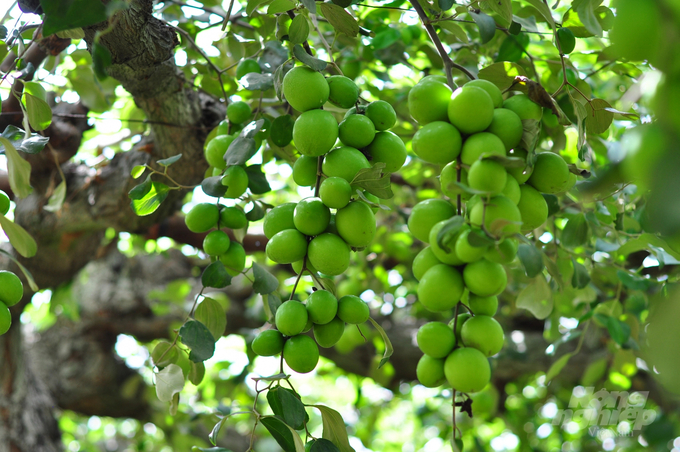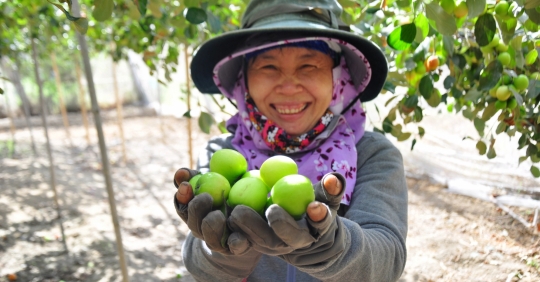Nguyen Van Chinh, director of the Plant Protection Center of the Nha-Ho Institute of Cotton Research and Agricultural Development (referred to as the Nha-Ho Institute for short), said that the south-central region is a drought-prone area and the problem of soil metamorphism is becoming very seriously. Therefore, planting black beans as vegetation in apple orchards helps improve the soil, limit weeds, and especially maintain soil moisture. The black bean stalks then become a very good source of organic fertilizer for the apple tree.

Currently, in Ninh Thuan, with a garden area of 1,000 m2, people collect 4-5 tons of apples, and the damage rate does not exceed 5%. Picture: Kim So
“Furthermore, planting black beans also creates ecological nests that help beneficial insects to thrive. In the bean garden, there are natural enemies such as large groups of spiders, parasitic wasps… If the nest is well cared for, it will limit the use of pesticides, increase economic efficiency and meet the requirements of safe production,” said Mr. Nguyen Van Chinh.
Besides netting the apple orchard to repel flies and fruit borers, the Nha Ho Institute also introduced the process of using tarps to cover the garden floor to eliminate weeds and planted black beans for vegetation. With this method, weed control is very effective and people don’t need to use toxic herbicides, reducing cost and effort.
Mr. Pham Dung, Director of Cultivation and Plant Protection Subdivision of Ninh Thuan Province, said: In addition to controlling flies and fruit borers, the application of planting vegetation with legumes to retain moisture and increase nutrition of the land is also important Effective. Besides, the types of light traps and glues are also effective in catching caterpillars and insect pests on apple trees.
Mr Pham Dung said: “With this integrated disease control process, local apple farmers hardly need to use any pesticides. Currently, farmers only need to use pesticides in the case of gardens. Mealybugs appeared on plants, powdery mildew With this cultivation method, the yield and quality of the apples increased greatly.

Algae quality and samples are greatly improved through pest and disease control and prevention. Picture: Kim So
Farmers used to collect about 4 tons of products per year on 1,000 m2 of apples, but the rate of damage caused by flies and fruit borers was up to 60-70%. Currently, 1,000 m2 farmers collect 4-5 tons of apples, and the damage rate does not exceed 5%. Therefore, the income from apple cultivation is very high with an average of 50 million VND/1,000 m2/year, after deducting the costs, the farmers have a net profit of 35 million VND/1,000 m2/year.
According to Mr. Pham Dung, the agricultural sector of Ninh Thuan province also plans to continue organizing training courses through integrated pest management programs to replicate the model. Agriculture in this province is aiming for 100% net apple area coverage in the entire province in the near future.
With integrated pest management (IPM), the proportion of damaged apples in the model was reduced to 5%; reduce over 20% of irrigation water, reduce 10-15% of fertilizer; Reduce 60-70% of the time spent spraying pesticides. The product quality is assured while the number of production fruits/year is reduced (the model only produces 1 harvest/year instead of the normal harvest for the non-focused collection all year round).
With the application of the integrated management process of fruit flies and some pests on apple trees, the applied areas no longer need to use pesticides to control flies and weeds as before. The proportion of undamaged apples is over 95%.

